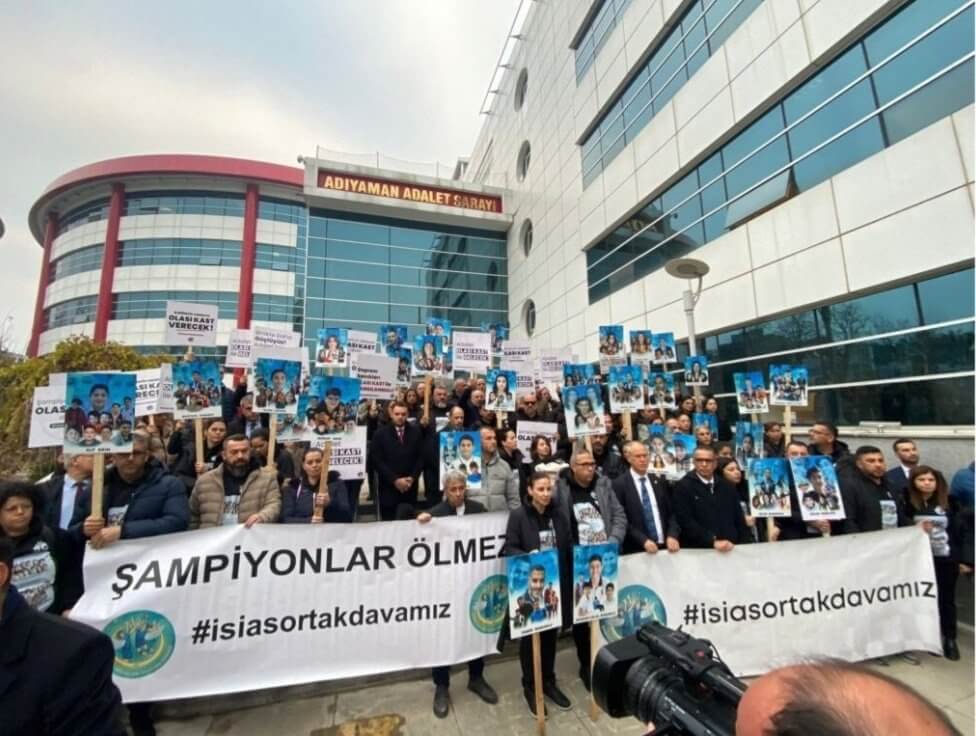The governor’s office of the eastern Turkish province of Adıyaman has allowed an investigation into four city officials due to their role in the collapse of a hotel during two powerful earthquakes last year in which 72 people were killed, the T24 news website reported.
The magnitude 7.8 and 7.5 earthquakes, which struck 11 provinces in Turkey’s south and southeast, left more than 53,000 people dead and hundreds of thousands injured or displaced while causing massive devastation.
The collapse of the Isias Hotel in Adıyaman led to the death of 35 people from the Turkish Republic of Northern Cyprus (KKTC), including 24 youngsters who had flown to Turkey to attend a student volleyball tournament.
Eleven people including the hotel’s owners were indicted in late 2023 on charges of “causing the death and injury of more than one person with conscious negligence” following an investigation. Prosecutors and families of the victims say the tragedy could have been averted had proper safety standards been met.
In January the trial of the 11 defendants began at a high criminal court in Adıyaman, which found widespread coverage in the Turkish and international media due to the death of the volleyball players from the KKTC in the tragedy. It was the biggest single tragedy in the history of the KKTC, which is recognized only by Ankara.
Families who travelled to Adıyaman to follow the trial in January complained about the non-inclusion of the public officials in the investigation who authorized and approved the defective hotel building that collapsed.
In Turkey the investigation and prosecution of public officials for crimes committed in the course of their duties is subject to a law requiring state government authorities, depending on the status of the individual in question, to grant permission for the process to start. Prosecutors have no right to proceed with an investigation without this permission, regardless of the amount or quality of evidence implicating a public official in a crime. They must first send the evidence recommending criminal investigation to the relevant administrative authority, which will then conduct a pre-investigation of its own to determine whether to give the prosecutor permission to proceed.
In line with a decision from the Adıyaman Governor’s Office, four officials from the Adıyaman Municipality who signed off the building permit for the hotel will be investigated.
They include a deputy mayor, an urban planning director, project licensing officer and an office technician.
Rights group calls for investigation into public officials
The lack of legal action against the public officials due to their role in the death of thousands of people in last year’s earthquakes also drew condemnation from Human Rights Watch (HRW) and Citizens Assembly, a nongovernmental organization, previously known as the Helsinki Citizens’ Assembly.
They released a statement in March describing the situation as “deeply troubling” and “unacceptable.”
Expert reports commissioned by public prosecutors in regions hardest hit by the earthquakes and seen by HRW identified municipal officials, along with private contractors and builders, responsible for defects in buildings that collapsed in the southern province of Kahramanmaraş and other places. Citizens’ Assembly has asked state authorities to provide information about the number of cases in which permission has been granted, as Turkish law requires, to pursue a criminal investigation into a public official. Citizens’ Assembly had received information that permission to investigate just three public officials has been granted, with the authorities for the most part refusing to provide answers.
With the addition of the four municipal officials in Adıyaman, the number of public officials investigated due to their role in the damage caused by the earthquakes has risen to seven.
The lack of investigations into public officials severely hampers proceedings in these cases, HRW and Citizens’ Assembly said. Courts hearing the cases are being prevented from determining the full background of how builders on trial were able to flout applicable building regulations to secure permits, evade thorough inspection and sell to the public buildings that were known to be unsafe.
Turkey has a history of failing to ensure that both private and public sector actors responsible for defective construction projects that have collapsed in earthquakes have been held accountable for their failures. Regarding the 1999 earthquake in the Marmara region of western Turkey, in which more than 17,000 people died, media reported on the very limited and slow proceedings against both private and very few public officials charged with misconduct. Most cases resulted in penalties being converted to fines or trials being dropped when they exceeded the statute of limitations.
